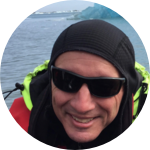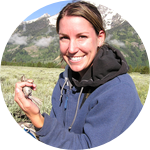About This Project
I research migration paths for the golden-crowned sparrow. Migration is one of the least understood phases of the life-cycle of these birds. During the winter of 2019, I plan to put GPS tags on 10 birds in California, as part of a larger tagging project. In 2020, I will go back to the same location to recapture the birds and collect the tags. I expect to retrieve 1 in 3 tags. I plan to download tag data and analyze the results to write up as a journal publication.
Ask the Scientists
Join The DiscussionWhat is the context of this research?
70% of temperate-zone migrating songbirds have shown widespread decline in western North America over the last few decades (Kirby et al. 2008). During migration, songbirds face many threats such as increased nutritional needs, altered predators, and navigational challenges. Adding to these inherent risks are human-caused effects such as habitat loss and climate change. Due to the speed of these landscape changes, songbirds are unlikely to evolve genetic adaptations that can keep pace (With 2015). Most research on migratory birds has occurred during the breeding season and migration is the least understood phase; delineating migration paths as well as habitat quality and threats along those paths are critical research needs (Faaborg et al. 2010).
What is the significance of this project?
The golden-crowned sparrow (GCSP) migrates along the Pacific flyway, wintering in California. For GCSP, researchers have already begun to help define migratory corridors as well as breeding areas in Alaska and Canada (Cormier et al. 2016, Seavy et al. 2012); however, the spatial accuracy was limited due to the tag type. With the new GPS technology available, it will be possible to obtain details on migration routes at a scale not previously possible, and ultimately provide the knowledge necessary for effective conservation efforts. Tagging individuals in this way provides an opportunity to quantify differences in movements across individuals, populations and years, and therefore the potential for these temperate-migrating species to adapt to global changes.
What are the goals of the project?
The cornerstone of this project will be tagging and retrieving tags from the migrating songbirds. The GPS tags need to be retrieved in order to download the data. I will tag birds in California at two locations - one coastal and one inland. I will begin tagging in winter 2019 when the species is wintering at the field sites. The birds will then be free to make their migration north to their breeding grounds. I will revisit these same sites the following winter (2020) to recapture these same birds and retrieve the tags! It may seem incredible to find these same individuals, but previous work has demonstrated that this kind of recapture for this species is indeed possible (see Cormier et al. 2016 and Seavy et al. 2012)!
Budget
With these funds, I will purchase miniaturized GPS tags to place on the birds. Fine-scale data from these tags will help me determine what threats they face on their arduous migrations, such as land-use changes, or shifts in resources due to climate change.
The trick with these tags is that I need to get them back to get the data they've recorded, and I expect about 1 in 3 tags back. This is because of their tiny size - they would be too heavy for the birds if they had the necessary equipment to send data to satellites. This means that every single tag offers an important opportunity and increases the impact and reach of this study.
Research funding from National Geographic has made this project possible, with logistics, purchase of an initial set of tags, and tag retrieval covered. As part of this larger project, my goal is to purchase 10 more tags to increase the knowledge-base needed for the conservation of these birds.
See my lab note on isotopes for the STRETCH FUNDS!
Endorsed by
 Project Timeline
Project Timeline
The timeline is all about winter. I will tag birds in the winter when they are residing at the field sites. Then, the following winter I will return to the sites to recapture the birds and retrieve the tags. I will then be able to download and analyze the data and then write a journal publication with the results.
Sep 12, 2018
Project Launched
Jan 31, 2019
Deploy GPS tags on golden-crowned sparrows
Jan 31, 2020
Retrieve GPS tags from golden-crowned sparrows the following year, and feathers
Jun 01, 2020
Analyze feather samples for stable isotopes
Jan 31, 2021
Publish data in scientific journal
Meet the Team
Autumn Iverson
I am a wildilfe ecologist and Ph.D. student in the Ecology program at the University of California, Davis. I am studying wildlife movement ecology, behavioral plasticity and the impacts of environmental change. I am investigating these aspects on both passerines and sea turtles, using data from stable isotopes and biologging tags such as satellite telemetry and GPS.
I received a BS and MS in Biology from U.C. San Diego where I studied habitat fragmentation and edge effects on native species. I’ve spent over 14 years working both around the country and abroad in the conservation ecology field. This experience has included surveying nesting songbirds in the expanses of sage at Grand Teton National Park, co-authoring a guidebook on Madagascar birds while at Conservation International in D.C., searching for new species in the Malaysian rainforests, and living and working in Australia where I sorted through seafloor samples from Antarctica. Since 2011, I've been contracted to the U.S. Geological Survey focusing on sea turtle research
where we investigate animal movement behavior and conduct spatial analyses.
I’ve presented research in scientific publications and at conferences. I have been the first author on two scientific articles, co-authored 14 others, a book chapter, and two poster presentations. I recently had the honor of being named a National Geographic Explorer.
Additional Information
Video clip credit of singing golden-crowned sparrows: Jay W. McGowan / Macaulay Library at the Cornell Lab of Ornithology (https://www.macaulaylibrary.org). Cover photo credit: TJ Gehling.
Project Backers
- 60Backers
- 102%Funded
- $4,488Total Donations
- $74.80Average Donation

